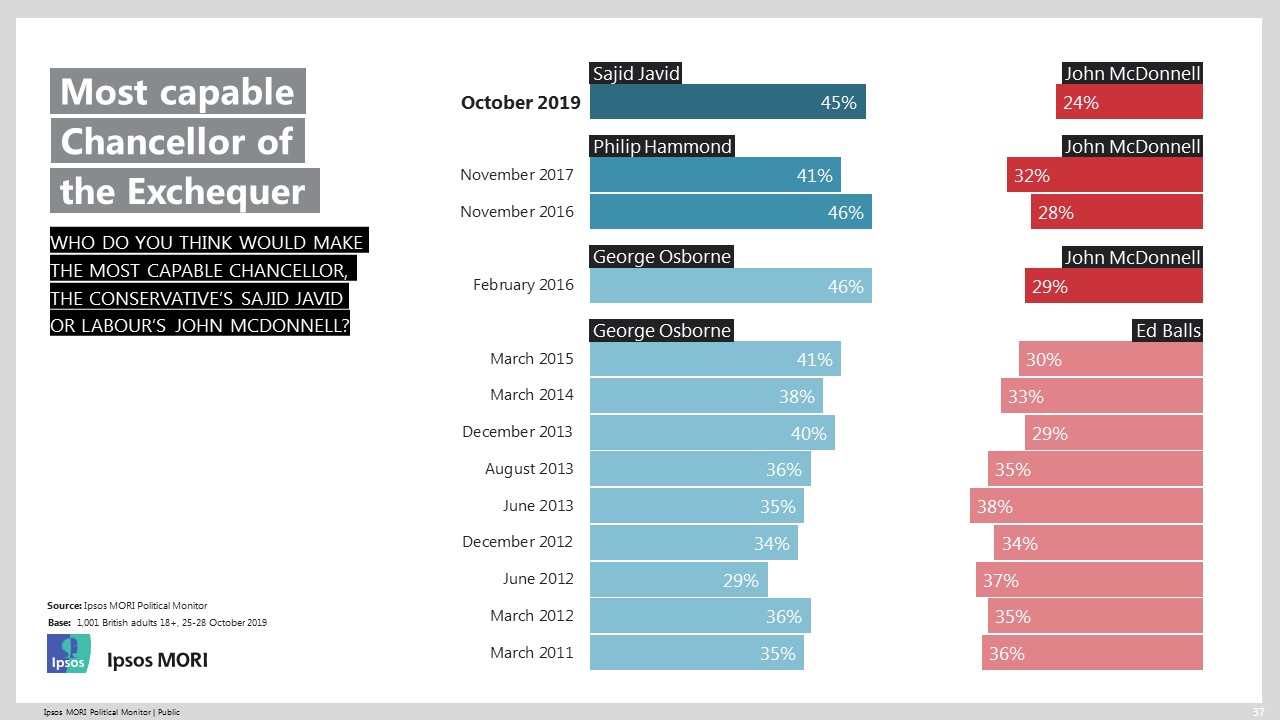Despite uncertainty on the health of the British Economy compared with other European countries Sajid Javid is still seen as the most capable Chancellor
- A third think the British economy will be worse off than other European countries in the next year – 23% think it will be better
- Just under half think Sajid Javid would be the most capable Chancellor compared with a quarter saying John McDonnell
- Britons are split on whether Boris Johnson’s government has done a good or bad job at managing the economy
The latest Ipsos Political Monitor shows that a third of the public (36%) think the British economy will be worse off than most other European countries compared with 23% who think it will be better off and 37% who think it will stay the same. Despite some uncertainty around the economy’s health more say Sajid Javid would be the most capable Chancellor compared with Labour’s John McDonnell (45% vs. 24%). One in nine (11%) say neither of them.

The new poll also reveals:
- A third (37%) of Britons are satisfied with the way Sajid Javid is doing his job as Chancellor of the Exchequer compared with a third (32%) dissatisfied. Three in ten (30%) however don’t know.
- Two-thirds (66%) of Conservative party supporters are satisfied with Sajid Javid while one in eleven (9%) are dissatisfied. This compares with a quarter (24%) of Labour supporters satisfied with him, while most (53%) are dissatisfied.
- Britons are split when asked if the government under Boris Johnson has done a good or bad job at managing the economy. Two in five (40%) say it has done a good job compared with another two in five (41%) who say a bad job. One on five (19%) don’t know
- When it comes to managing taxation and public expenditure more say the government has done a bad job than good job (47% vs. 32%) with 22% saying they don’t know.
- A majority of the public (56%) want the government to increase public spending, even if that means higher taxes or more government borrowing although there are fewer who think this now than in October last year (66%). One in three (31%) say the government should keep spending at the current level (up 11 points) while one in ten (10%) want to reduce spending on public services to allow for tax cuts or less borrowing (up 2 points).
- The public however are split when it comes to what they think the government will do. A third (35%) think it will increase spending, 28% think it will keep spending as it is now, while 30% think it will reduce spending.
Gideon Skinner, Head of Politics at Ipsos, said:
Public attitudes to the economy neatly sum up some of the different dynamics of the campaign. Overall, people are pessimistic about the economy – and have become more worried Britain will fall behind other European countries since 2011. And only one in three think the government will increase public spending, even though that is what most people want (albeit an improvement from a year ago). But despite that, Labour isn’t persuading people that John McDonnell would make a more capable Chancellor than the Conservatives’ Sajid Javid, and the gap is wider than when George Osborne was facing Ed Balls.





